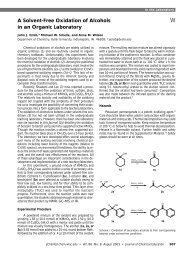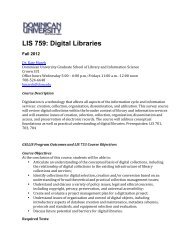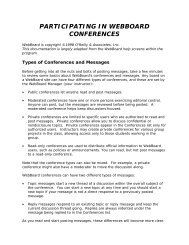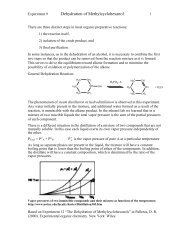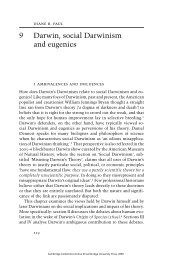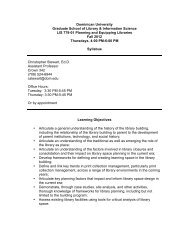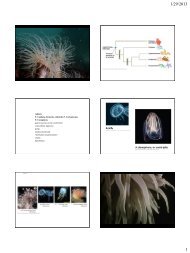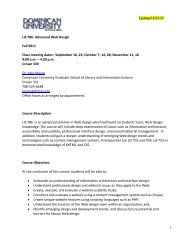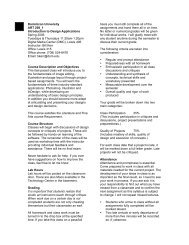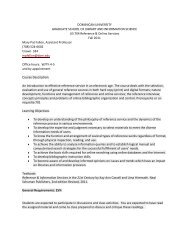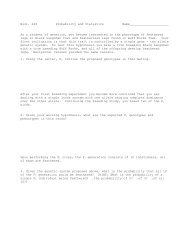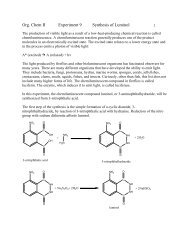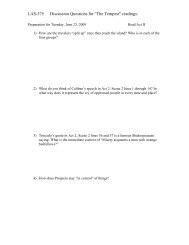SYLLABUS Organic Chemistry I CHEM253 Fall 2008
SYLLABUS Organic Chemistry I CHEM253 Fall 2008
SYLLABUS Organic Chemistry I CHEM253 Fall 2008
Create successful ePaper yourself
Turn your PDF publications into a flip-book with our unique Google optimized e-Paper software.
8<br />
Some Reflections On Teaching and Learning:<br />
My job is to identify and develop the major conceptual issues for the course and then to<br />
show how those concepts are used in understanding chemical reactivity. In addition, I<br />
hope to articulate the connections between concepts in this class, lab, and other classes<br />
that you are taking. I would also like to share with you some of the exciting modern<br />
advances in organic chemistry and the applications. In order to accomplish these goals, I<br />
would like to have an interactive classroom with feedback from you. This possibility<br />
means less lecturing and more discussion with a focus on problem solving and conceptual<br />
understanding. Hopefully, we can create an environment where it is possible to ask<br />
questions, take risks and even fail. Listed below are some suggestions which will help<br />
you to learn organic chemistry and will also help set up an interactive, constructive<br />
environment.<br />
1. Come to class. Regular attendance is expected. You are responsible for all<br />
information disseminated at all class meetings. If you are not there, you will miss the<br />
flow of events, the questions and discussion of your peers, and information given in<br />
the lecture.<br />
2. Work problems. Work all of the problems in the text and at the end of the chapter.<br />
Try to work the problems in a reflective manner. Test your understanding of<br />
concepts. Don't jump to the solutions manual if the answer is not immediately<br />
apparent. As the exams and quizzes will test your ability to apply the material to new<br />
situations and problems, it is critical that you understand the concepts. There are also<br />
be problems and exercises on-line at the <strong>Organic</strong> <strong>Chemistry</strong> Companion Page. If you<br />
are having difficulties, this might be a place to find extra insight.<br />
3. Read the chapter ahead of time. This suggestion does not have to be an intensive<br />
effort. A look at which functional groups are involved, the topic headings, and the<br />
type of reaction will give you some sense of where we are headed.<br />
4. Study diagrams and tables. They are more than pretty pictures. They can pull together<br />
what is being described in the text in a very vivid way.<br />
5. Explore the on-line supplementary materials. The animations are awesome and show<br />
chemical structure and reactivity in a very dramatic way.<br />
6. It is absolutely essential that you learn the vocabulary of organic chemistry. Important<br />
words and terms must be memorized. The textbook puts key terms in boldface and<br />
includes them in the "Key Terms" section at end of each chapter.<br />
7. If you are in trouble, ask for help. I have posted office hours at which time I will be<br />
available to answer questions. I will also be glad to make an appointment for other<br />
times. If you have a quick question, feel free to contact me by email. In addition, I<br />
will organize help sessions if a group of students are having difficulty with a<br />
particular topic or if the class requests a review session before an exam. Remember,<br />
in the end, you are responsible for learning.



